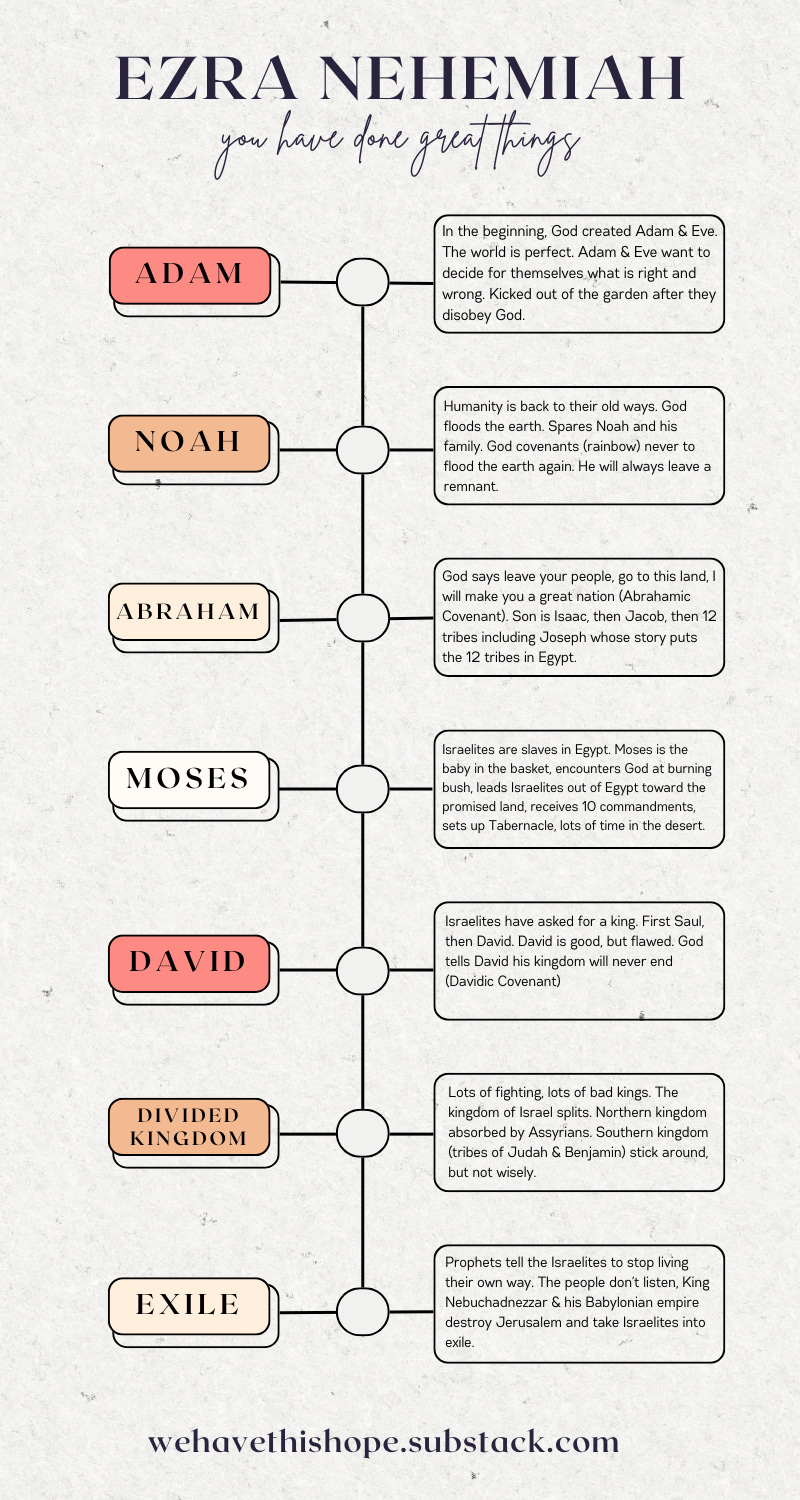Stack Study: You Have Done Great Things
the first ever Bible study via Substack....welcome to Lesson 1.
Welcome to the first edition of Stack Study: You Have Done Great Things!
This is the introductory lesson to the our six-week deep dive into the Old Testament books of Ezra and Nehemiah. Today’s post includes a bit of housekeeping so don’t be scared by its length. Consider breaking it up into smaller increments over the week. In crafting this iteration of the study, my prayer has been that it would be accessible to anyone who is even moderately hungry for the Biblical story—a low hanging fruit for those who are willing to reach their hands up just a little bit.
Maybe that’s you…
In many ways this study has been the labor of love that set in motion everything you see here at We Have This Hope. What started as an investigation into an unfamiliar story turned into a burning in my heart that keeps me typing in the wee hours of the morning. Today I want to tell you that I earnestly believe these ancient texts can ignite a curiosity in you that won’t leave alone—that’s certainly what they’ve done for me.
As you consider joining me, I pray the Spirit of the Living God would reveal to you the intricacies of His Word that tell the story of a God who has always loved His people. The story of a God who has always loved you and will bring you back to Him with songs of joy, sheaves overflowing with the great things He has done.
In his book Eat This Book, Eugene Peterson talks about the lost art of reading scripture. He says that it’s almost universally accepted by believers that the Bible is the Word of God with authority and truth for humanity, yet we hardly approach it. When we do approach it, we look to it as more of an informative self-help guide, interpreting everything about it from our own perspective rather than consuming it as vital for our souls—digesting it, metabolizing it, letting it do the work in us rather than us doing the work for it. This slow, book-eating approach is what informs the simple format of our study: read the text, ask 3 questions, think & pray.
It’s going to be a long meal, one that we don’t rush because the dessert is sweeter if you’ve savored all the courses.
Below is a primer on the 3 questions I use when studying the Bible. If you haven’t already read the post from earlier this week, I’d recommend going back and scrolling directly to the section covering the 3 questions. Although the method is fairly simple, this will offer you a bit more depth.
1) What does it say?
This is what I affectionately call the first grade reading comprehension question. It answers the who, what, when, where questions. Don’t skip this step even if the passage is familiar to you.
2) Why did it matter?
Deliberately past tense, this question is all about context. What was happening at the time this was written? Economically, politically, socially? Think how strange it would be to read a book like Pride and Prejudice as if it were written for us in 2025. It’s so much richer if you understand a little about English culture in the early 19th century. Same with the Biblical text. Be as nerdy as you want with this one. I started out with Holman Illustrated Bible Commentary for concise commentary and BlueLetterBible.org accessing Greek and Hebrew language tools.
3) Why does it still matter?
You guessed it….application. What does this mean for me? What does this say about God’s character? How can I mediate on this during the day?
Most of us know a few Old Testament Sunday school stories. Who built the ark? Noah…Noah…Veggie Tales anyone? The Israelites wandered in the desert, David beat Goliath, and some guy named Jonah was swallowed by a whale. These stories are familiar, but placing them in context to each other and the entirety of the Biblical narrative can be overwhelming. Before we pick up with prophets and exiles, I want you to feel comfortable stepping into the map—to know where we are in the Story (capital S) because so much of the richness of Ezra Nehemiah comes from the what’s happened before and what’s promised to happen in the future.
Here are a few ways to step into the map. I recommend this being the first thing you do as a you prepare for the study. If you’re breaking this up over the course of the week, think of this as Day One. Even if you feel like you know the Old Testament, choose one of these options as a refresher.
Listen to this early episode of the We Have This Hope podcast. It’s 13 minutes and I give a rapid-fire overview of the Old Testament.
Watch this Bible Project video titled Old Testament Summary: A Complete Animated Overview where Tim Mackie shows us how its done in 12 minutes.
Or simply study this little chart I’ve created.
Our study begins by looking at two of the most well known and lengthy prophets in the Bible: Jeremiah & Isaiah. What is a prophet though? This word carries some of baggage in our culture today. We might hear the word and imagine that strange guy on campus who always shouted about end times or the televangelist that took some of your grandma's money, but in the Old Testament prophets played an essential and respected role because they were considered the mouthpiece of God. They often served directly under kings in an advisory sort of role. And because they were God’s ambassadors to the people, they were often held to a higher standard of accountability much like priests. While they often relayed predictions or warnings for the future, as we’ll see today, their emphasis was usually on calling God’s people to return to holiness and to the covenant.
Read Jeremiah 25:1-14
What does it say? (remember 1st grade reading comprehension)
Jeremiah is speaking to all the Israelites during the reign of King Jehoiakim.
He has warned the people that if they don’t stop doing evil, don’t stop making idols, they will not get to stay in the promised land. He’s warned them for 23 years and they have not listened.
Because they have not listened, God will send King Nebuchadnezzar of Babylon to conquer them. They will humiliated and ousted. Their land will be a desolate wasteland.
It will be this way for 70 years and after that King Nebuchadnezzar will be overthrown.
Why did it matter?
This was a warning from the prophet to the people. Jeremiah told them what their consequence would be and according to Daniel 1:1-2 it happened just as he said it would.
In the third year of the reign of Jehoiakim king of Judah, Nebuchadnezzar king of Babylon came to Jerusalem and besieged it. And the Lord delivered Jehoiakim king of Judah into his hand, along with some of the articles from the temple of God. These he carried off to the temple of his god in Babylonia[a] and put in the treasure house of his god. - Daniel 1:1-2, NIV
Read Jeremiah 29:10-14
What does it say?
Jeremiah is speaking on behalf of God to the freshly conquered/exiled Israelites.
When 70 years are completed, the Babylonians will be ousted and God will bring His people back to the promised land.
God has good plans to restore His people, to bring them back from exile. They are invited to seek, trust, and know God.
Why did it matter? (step into the map)
Jeremiah is speaking to the exiles right after their city has been decimated and they have been enslaved. Recall that this people group is not unfamiliar with slavery and homelessness. During the time of Moses, they were enslaved by the Egyptians then wandered in the desert for years living in tents before finally settling in the promised land. As they are surrounded by all that they’ve lost—their home, their land, their inheritance—God assures them He will make it right again.
This is the perfect example of why good exegesis1 is important. Jeremiah 29:11 is not about going off to college or having a stable family life in middle America. In context, we see that God is speaking promises about His future plan to bring His people back. This was a hope-filled promise to a devastated, much loved people.
Read Isaiah 44:24-28; 45:13
What does it say?
God is speaking through the prophet Isaiah this time. He says Jerusalem will be rebuilt and the foundations of the temple laid again.
Someone named Cyrus will be raised up to make this happen. Cyrus will rebuild the city and set exiles free.
Why did it matter?
Isaiah was an 8th century prophet (740-681BC) and Jeremiah served under the last five kings of the Southern kingdom (627-586C). A quick look at a timeline indicates that Isaiah’s prophecy about someone named Cyrus returning exiles to Jerusalem happened BEFORE Jeremiah warned them to get it together and BEFORE the exile. This warning from Isaiah came at a time when the exile wasn’t even on the horizon and yet it’s so specific. Is it possible that Isaiah’s contemporaries had no clue what he was even talking about?
Stay with me because here’s my favorite detail…
Read Ezra 1:1-3
Did you catch the name of the Persian king who shows up in the very first verse of Ezra? Right on cue, King Cyrus overthrows the Babylonians just as Jeremiah said someone would do. And in an even more unprecedented move, this conquering king tells his enslaved subjects that they can go home…just as Isaiah said he would do. The exiles can return and take everything they need with them.
What I hope you haven’t missed is that Isaiah’s prophecy about Cyrus took place nearly 150 years before the Persian empire existed and well before Cyrus had likely even been born. As we step into the story of returning exiles, we cannot miss the essential point that all God said He would do has now come true.
Why does it still matter?
All this prophecy can make my eyes start to cross, but the scene is now set for us to meet Zerubabbel, Jeshua, Ezra, Nehemiah, and a bunch of other scrappy, determined, weeping and rejoicing Israelites who will make the trek back home.
Two things stand out to me as I think about how to apply what we’ve read this week. The first is the obvious nature of fulfilled promises and what that can do to the hope we build our lives around. If God says He will do something, it seems He will, even if the path by which He chooses to execute a plan seems wildly unorthodox to us.
In many ways I find that I’m not too dissimilar from an Israelite standing among the ruins of a place I helped to crumble. How quickly I forget that I too have been given a promise that one day God will redeem all of it. “Now we see in a mirror dimly” as Paul says2 or said another way: sometimes the plan seems a bit hazy. But God has laid out His plan for restoration with twinkles of specificity that today’s lesson reminds us are often vital to the plan.
“She will give birth to son, and you are to give him the name Jesus…” Matthew 1:21
“‘…he has anointed me to proclaim good news to the poor…’” Luke 4:18
“…whoever believes in Him will not die, but have everlasting life.” John 3:16
“‘And if I go and prepare a place for you, I will come back and take you to be with me…’” John 14:3
Secondly is the story of Cyrus—the unbelieving king called before he was born to fulfill the prophecies of God and send the people back from exile.
God knew his name.
When I was pregnant with our first daughter, I knew before she came into the world what we would call her. We chose it with care, with a sense of responsibility, because even though we had never named a human, we understood intuitively that a name holds weight. In Psalm 139 David teaches us that God sees our unformed body in the secret place where we’re made, that He knows every day we’ll be alive before the first one begins. Paul says in Ephesians 2 that we are God’s handiwork, created with a purpose set in advance by God. These scriptures fall fresh on my mind as I think of Cyrus and the God who called him by name and knit him together in someone’s womb.
Often in reading these Old Testament stories, the tendency is the view the characters as puppets in some play that God is pulling the strings to orchestrate, but this small detail of naming Cyrus reveals something beautiful to me—God was tender toward him. I wonder if we might pause to reflect on the intimacy that comes with giving someone a name. And if we might take it one step further and remember that God has given us a name—yes, through our parents—but with the same intention by which He called Cyrus to play a vital role in restoring a kingdom.
How do the fulfilled prophecies of Jeremiah and Isaiah stir your affections or thoughts toward God?
How does it feel to remember God calls you by name?
When you examine your own timeline with God, in what ways can you mark His faithfulness or restoration in your life?
Two books I love & recommend for starting out: How To Read The Bible For All It’s Worth and Epic of Eden: A Christian Entry into the Old Testament
Two free downloads that you’re welcome to have for your own study!
Thanks for joining me all the way to the end! This lesson is notably longer than what is to come only because we had to set the stage. I hope you found a way to break it up over the course of the week. Next Thursday, we’ll examine the first half of Ezra.
Please feel free to welcome others into this study. You can do so easily by sending them the link to subscribe for free to We Have This Hope!
The process of understanding the Biblical text for its original meaning. Here’s a great article if you want to learn more.










